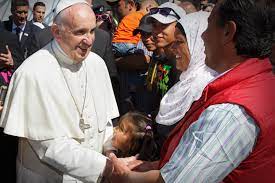World Day of Migrants and Refugees
Sunday, September 26th
Towards an ever wider WE
It’s not just about migrants, it’s about not excluding anyone.
It’s about putting the last and the least in first place.
 Church has been celebrating the World Day of Migrants and Refugees (WDMR) since 1914. It is always an occasion to express concern for different vulnerable people on the move; to pray for them as they face many challenges; and to increase awareness about the opportunities that migration offers.
Church has been celebrating the World Day of Migrants and Refugees (WDMR) since 1914. It is always an occasion to express concern for different vulnerable people on the move; to pray for them as they face many challenges; and to increase awareness about the opportunities that migration offers.
world Every year the WDMR is the last Sunday of September; in 2021 it will be celebrated on 26 September. As the title for his annual message, the Holy Father has chosen Towards an ever wider “we”.
Dear brothers and sisters,
In the Encyclical Fratelli Tutti, I expressed a concern and a hope that remain uppermost in my thoughts: “Once this health crisis passes, our worst response would be to plunge even more deeply into feverish consumerism and new forms of egotistic self-preservation. God willing, after all this, we will think no longer in terms of ‘them’ and ‘those’, but only ‘us’” (No. 35).
For this reason, I have wished to devote the Message for this year’s World Day of Migrants and Refugees to the theme, Towards An Ever Wider “We”, in order to indicate a clear horizon for our common journey in this world.
The history of this “we”.
That horizon is already present in God’s creative plan: “God created humankind in his image, in the image of God he created them; male and female he created them. God blessed them, and God said to them, ‘Be fruitful and multiply’” (Gen 1:27-28). God created us male and female, different yet complementary, in order to form a “we” destined to become ever more numerous in the succession of generations. God created us in his image, in the image of his own triune being, a communion in diversity.
When, in disobedience we turned away from God, he in his mercy wished to offer us a path of reconciliation, not as individuals but as a people, a “we”, meant to embrace the entire human family, without exception: “See, the home of God is among mortals. He will dwell with them; they will be his peoples, and God himself will be with them” (Rev 21:3).
Salvation history thus has a “we” in its beginning and a “we” at its end, and at its centre the mystery of Christ, who died and rose so “that they may all be one” (Jn 17:21). The present time, however, shows that this “we” willed by God is broken and fragmented, wounded and disfigured. This becomes all the more evident in moments of great crisis, as is the case with the current pandemic. Our “we”, both in the wider world and within the Church, is crumbling and cracking due to myopic and aggressive forms of nationalism (cf. Fratelli Tutti, 11) and radical individualism (cf. ibid., 105). And the highest price is being paid by those who most easily become viewed as others: foreigners, migrants, the marginalized, those living on the existential peripheries.
The truth however is that we are all in the same boat and called to work together so that there will be no more walls that separate us, no longer others, but only a single “we”, encompassing all of humanity. Thus I would like to use this World Day to address a twofold appeal, first to the Catholic faithful and then all the men and women of our world, to advance together towards an ever wider “we”.
To read the complete message of Pope Francis for World Day of Migrants and Refugees 2021, please click here
To access videos about this special day click here:
